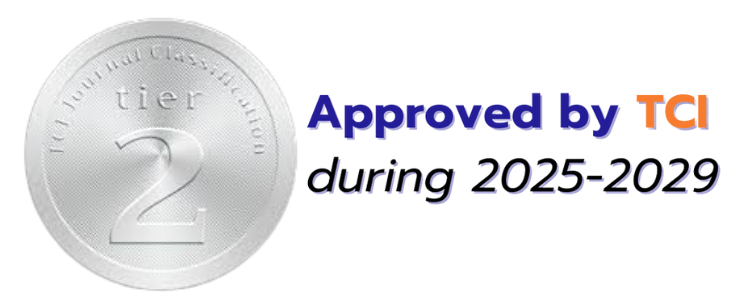การพัฒนาความสามารถในการนำความรู้เรื่องพลังงานความร้อนไปใช้ในชีวิตประจำวัน ของนักเรียนชั้นมัธยมศึกษาปีที่ 1 ผ่านกิจกรรมการเรียนรู้โดยใช้บริบทเป็นฐาน
The Development of Seventh Grade Students’ Ability in Application of Thermal Energy in Daily Life through Context-based Learning
Abstract
การวิจัยในครั้งนี้มีจุดประสงค์เพื่อศึกษาและเปรียบเทียบความสามารถในการนำความรู้เรื่องพลังงานความร้อนไปใช้ในชีวิตประจำวันก่อนเรียนและหลังเรียนและเพื่อศึกษาความพึงพอใจของนักเรียนชั้นมัธยมศึกษาปีที่ 1 เรื่อง พลังงานความร้อน ที่เรียนด้วยแผนการจัดกิจกรรมการเรียนรู้โดยใช้บริบทเป็นฐาน กลุ่มตัวอย่างในการวิจัยนี้เป็นนักเรียนชั้นมัธยมศึกษาปีที่ 1 โรงเรียนมัธยมศึกษาขนาดใหญ่แห่งหนึ่งในจังหวัดสุพรรณบุรี ปีการศึกษา 2561 จำนวน 40 คน ได้มาโดยการเลือกแบบเจาะจง รูปแบบของการวิจัยเป็นการวิจัยก่อนมีแบบการวิจัยเชิงทดลอง (pre-experimental design) แบบกลุ่มเดียววัดผลก่อนและหลัง (one-group pretest-posttest design) เครื่องมือที่ใช้ในการวิจัย ได้แก่ 1) แผนการจัดการเรียนรู้โดยใช้บริบทเป็นฐาน เรื่องความร้อนกับการเปลี่ยนแปลงของสสาร จำนวน 4 แผน รวม 16 ชั่วโมง 2) แบบทดสอบวัดความสามารถในการนำความรู้ไปใช้ในชีวิตประจำวัน แบบปรนัย 4 ตัวเลือก จำนวน 24 ข้อ และ 3) แบบประเมินความพึงพอใจที่มีต่อการจัดการเรียนรู้โดยใช้บริบทเป็นฐาน ซึ่งมีลักษณะเป็นแบบมาตราส่วนประมาณค่า 5 ระดับ วิเคราะห์ข้อมูลโดยใช้สถิติค่าร้อยละ ค่าเฉลี่ย ส่วนเบี่ยงเบนมาตรฐาน และการทดสอบที (t-test) ผลการวิจัยพบว่านักเรียนมีความสามารถในการนำความรู้เรื่องพลังงานความร้อน ไปใช้ในชีวิตประจำวันหลังเรียนโดยการจัดกิจกรรมการเรียนรู้โดยใช้บริบทเป็นฐานอยู่ในระดับพอใช้ขึ้นไป แต่ผลความสามารถของนักเรียนเพิ่มสูงขึ้นกว่าก่อนเรียนอย่างมีนัยสำคัญ (t(df =39)= 3.929, p<0.01) ความพึงพอใจของนักเรียนต่อการเรียนรู้โดยใช้บริบทเป็นฐานอยู่ในระดับมาก
The purpose of this research was to study and compare students’ ability in application of knowledge of Thermal energy in daily life before and after context-based learning lessons, as well as to identify their satisfaction towards learning. The participants were 40 Grade7 students in the second semester of 2018 academic year from a large school in Suphanburi Province. This research employed a pre-experimental design; one-group pretest-posttest design. The instruments consisted of 4 thermal energy lesson plans extended over 16 hours of class time, a 24 multiple-choice-item test to assess students’ ability in application of knowledge of thermal energy in daily life, and 5-point rating scales of satisfaction on the context-based learning lessons. The data were analyzed using means, percentages, standard deviation and T-test. The findings showed that, after the learning lessons, the students acquired the ability to apply of knowledge of thermal energy in daily life at a moderate level but they were significantly improved from before the lessons (t(df=39)= 3.929, p<0.01). Student satisfaction of the lessons using context-based learning was high.







